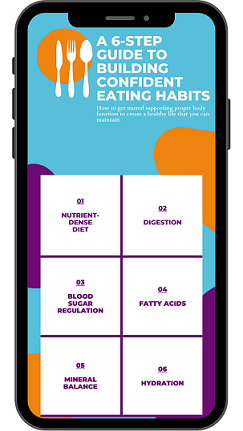Mindful eating is a simple habit to stop overeating. Eating slower can lessen guilt if you struggle with feeling out of control around food. Our modern society is fast paced. If I asked how you’re doing, there’s a good chance “busy” would be included in your response. Weekdays you rush to get out of bed and out the door. You work all day. You spend what’s left in the day cooking, cleaning, and with family. Weekends are full of activities for the kids, hanging out with friends, grocery shopping, and more cleaning. We’re so used to having to rush because we just don’t have the time to spare. You especially rush eating, because that’s the least of your worries. I’m sharing why you should slow down when eating and 3 tips to get in the habit of practicing mindful eating.
What is mindful eating?
I like to define it as completely enjoying your food. You eat slowly and pay attention while you eat. Think about your last meal…
- Were you standing while you ate?
- Did you finish eating in 10 minutes or less?
- Did the thought cross your mind of needing to eat quickly to move on with your day?
If you answered yes to 1 or more of those questions, you were not practicing mindful eating. Keep reading to learn more.
Why is mindful eating important?
Eating too fast or not fully paying attention while you eat…
- results in overeating and guilt. It takes time for your gut to tell your mind that you are getting full. Eating too fast can lead to eating more than you need. You end up feeling guilty for eating too much. Slowing down allows proper fullness cues, so you can stop eating before going too far.
- disrupts the mind/gut connection required for healthy digestion. Digestion begins when you think about taking your first bite. Full digestion of our food is necessary to take in the nutrients we are eating. If we aren’t digesting our food properly, we can have digestive discomfort (gas, bloating, constipation, etc.). This can be associated with that “stuffed” feeling you get after eating. We also will not fully absorb nutrients required for healthy function. Slowing down allows your mind to signal to your gut to begin the digestive process.
Here are 3 tips to create a mindful eating habit, so that you can enjoy your food more, stop overeating, and lessen digestive discomfort.
- Sit down when eating. If you’re standing when eating, you’re not relaxed and focused on your food. Sit, take 3 breaths, and allow your mouth to salivate at the smell of your food. This improves digestion and starts the process to slow down while eating.
- Chew each bite 30 times to take longer to eat. Your teeth have a job of breaking down your food before swallowing. Chewing each bite 30 times will make sure that each bite is completely broken down, making it easier for your stomach to continue digesting. You can think of chewing until each bite to the consistency of mashed banana to make it easier.
- Put your silverware down between each bite to stay present when eating. Enjoy the flavor of the food you are choosing to eat. Forcing this pause between bites will remind you to take the time to chew. You’ll find more joy in eating.
Mindful eating is a skill that improves your overall health and enjoyment of eating. The focus of improving our nutrition tends to be on what we eat, but how we eat can make just as big of an impact. My clients have said practicing mindful eating allows them to eat less and feel more confident about their eating habits. I challenge you to practice mindful eating at your next meal. Put a note in your silverware drawer with these 3 words as a reminder on how to eat mindfully: sit, chew, and enjoy.
Are you interested in learning more ways to simplify a healthy life? Click here to read 3 Easy Ways to Take Control of Your Health.


